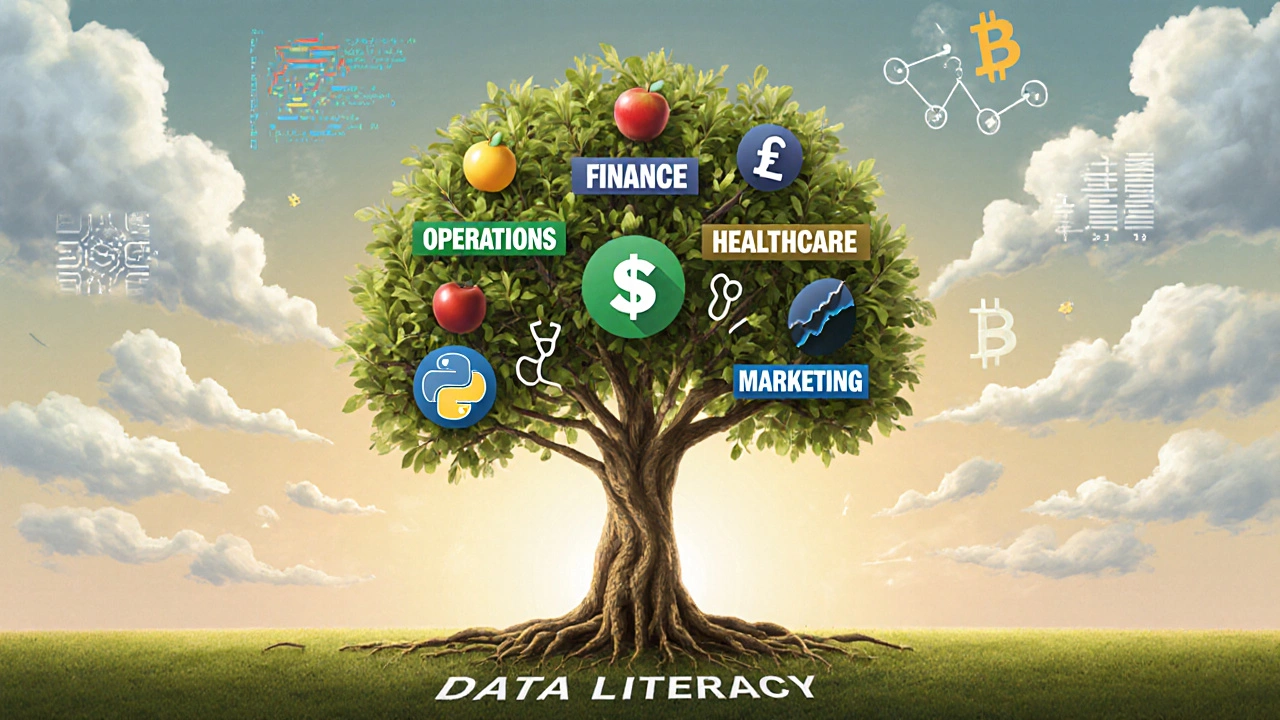Nov
20

- by Dhruv Ainsley
- 0 Comments
When you’re thinking about an MBA, the biggest question isn’t just which MBA field is most in demand-it’s which one will actually pay off for you. Not in five years. Not in some abstract global report. Right now, in 2025, with inflation still ticking, AI reshaping jobs, and companies scrambling to stay competitive, the answer has shifted. It’s no longer about prestige or tradition. It’s about skills that directly move the needle for businesses.
Finance Is Still Strong, But It’s Not What It Used to Be
Corporate finance used to be the golden ticket. Every top MBA grad wanted to land in investment banking or private equity. That’s still true-but the field has changed. Today’s finance roles aren’t just about spreadsheets and valuation models. They’re about data. Algorithms. Risk modeling using machine learning. Companies now hire MBAs with finance backgrounds who can interpret real-time market signals, not just crunch historical numbers.
Look at firms like BlackRock or JPMorgan Chase. They’re hiring MBAs not just to manage portfolios, but to build AI-driven trading systems. The average salary for an MBA in finance in Australia is now $135,000 AUD, with top roles in fintech or quantitative analysis hitting $180,000. But here’s the catch: if your MBA program didn’t teach you Python, SQL, or basic data visualization, you’re already behind.
Operations and Supply Chain Are Booming-And Underestimated
After the pandemic exposed how fragile global supply chains were, companies didn’t just fix their logistics-they rebuilt them. And they need MBAs to lead that change. Operations management isn’t about managing warehouses anymore. It’s about designing resilient networks, using predictive analytics to forecast disruptions, and integrating sustainability into procurement.
In Melbourne, companies like BHP and CSL are hiring MBA graduates to optimize their global supply chains. The demand has jumped 40% since 2022. These roles pay well-$120,000 to $150,000 AUD-and often come with international assignments. Yet, fewer than 12% of MBA students choose this path. Why? Because it doesn’t sound glamorous. But in 2025, the people who keep the lights on are the ones getting promoted fastest.
Technology Management Is the Fastest-Growing MBA Field
If you’re not thinking about tech, you’re missing the biggest shift. Technology management isn’t for coders. It’s for business leaders who understand how to bridge the gap between engineers and executives. This specialization teaches you how to manage product teams, allocate budgets for AI tools, and measure ROI on digital transformation projects.
Companies like Atlassian, Canva, and even traditional banks like Westpac are hiring MBAs with tech management backgrounds to lead their digital teams. These aren’t IT roles. These are leadership roles. The average salary? $140,000 AUD. And it’s growing faster than any other MBA specialization. In fact, 73% of tech firms now say they’d rather hire an MBA with tech experience than a computer science grad without business training.
Healthcare Management Is Surging-And It’s Not Just Hospitals
Healthcare isn’t just about doctors and nurses anymore. It’s about data systems, insurance algorithms, telehealth platforms, and pharmaceutical supply chains. Australia’s aging population and Medicare reforms have created a massive need for MBAs who can run healthcare organizations efficiently.
Organizations like Medibank, Ramsay Health, and even startups building AI diagnostics are hiring MBA grads in healthcare management. These roles pay $115,000 to $160,000 AUD. And unlike finance or tech, this field has less competition. Fewer than 5% of MBA students in Australia specialize in healthcare. That means less noise, more opportunity.

Marketing Has Been Totally Rewritten-By AI and Data
Remember when marketing MBAs learned about focus groups and TV ads? That’s ancient history. Today’s marketing roles are about customer data platforms, AI-driven personalization, attribution modeling, and lifetime value optimization.
Companies like REA Group and Seek aren’t hiring marketers-they’re hiring data storytellers. An MBA in marketing now means knowing how to use tools like Google Analytics 4, Adobe Experience Cloud, and CRM platforms like Salesforce. You need to understand conversion funnels, A/B testing, and predictive customer behavior. The average salary? $110,000 AUD. But if you can prove you increased customer retention by 20% using data, you’ll be offered $140,000+.
Entrepreneurship Is Still Valuable-But Only If You’re Ready to Build
Many MBA students think entrepreneurship is the path to freedom. It is-but only if you’re willing to grind. The reality? Most startup-focused MBA programs don’t teach you how to get your first $100,000 in revenue. They teach you how to pitch to investors. That’s not enough.
The real winners are those who combine entrepreneurship with another specialization-like tech or healthcare. For example, an MBA grad who built a telehealth app for rural clinics in Queensland and raised $2M in seed funding is far more valuable than someone who just wrote a business plan in class. If you want to start a company, don’t just take the entrepreneurship track. Pair it with a technical or operational skill.
What About Sustainability and ESG?
Yes, ESG (Environmental, Social, Governance) is hot. Companies are setting net-zero targets. Investors are demanding transparency. But here’s the problem: most ESG roles in 2025 are still filled by consultants or compliance officers-not MBA grads.
The real opportunity isn’t in writing sustainability reports. It’s in embedding sustainability into core business decisions. That means an MBA in operations who redesigns a supply chain to cut emissions by 30%, or a finance MBA who structures green bonds for renewable projects. Those are the roles that pay $130,000+ and get noticed by leadership. Don’t choose ESG because it’s trendy. Choose it because you can turn it into measurable business value.

So, Which MBA Field Is Most in Demand?
Let’s cut through the noise. In 2025, the most in-demand MBA field isn’t one single thing. It’s the one that combines business strategy with technical execution. Technology management leads the pack because every industry is becoming a tech industry. But operations and healthcare management are close behind-especially if you’re in Australia, where infrastructure and aging populations are driving demand.
Finance and marketing are still strong, but only if you’ve upgraded your skills. If you’re still using 2018 tools in 2025, you’re not competitive.
The real answer? Pick the field that matches your strengths and adds hard skills you don’t yet have. If you’re analytical, go tech or operations. If you’re people-focused, try healthcare or marketing. If you want to build something, combine entrepreneurship with a technical skill. Don’t chase what’s popular. Chase what you can excel at-and what companies are desperate to pay for.
What You Should Do Next
- Look at job postings on Seek and LinkedIn for MBA roles in your city. Don’t just check titles-read the requirements. What tools, certifications, or skills are listed?
- Reach out to three recent MBA grads in your target field. Ask them: "What’s one skill you wish you’d learned before graduation?"
- Take a free online course in Python, SQL, or Google Analytics. If you can complete it in 4 weeks, you’re already ahead of 80% of MBA applicants.
- If you’re unsure, pick the specialization that gives you the most options. Technology management opens doors in finance, healthcare, retail, and government. That’s flexibility.
Is an MBA still worth it in 2025?
Yes-but only if you choose the right specialization and upgrade your skills. An MBA without technical or data literacy is becoming outdated. The highest-paying roles now require you to speak both business and tech. If you’re willing to learn tools like Excel, SQL, or Power BI alongside your MBA, the return on investment is still strong-often over 200% within three years.
Can I switch to a high-demand MBA field if my undergrad is in humanities?
Absolutely. Many top MBA programs in Australia, like Melbourne Business School and UNSW, accept students from non-business backgrounds. What matters is your ability to learn quickly and show initiative. Take a free online course in data analysis or accounting before applying. Many applicants get in not because of their degree, but because they demonstrated curiosity and preparation.
Do I need to go to a top-tier school to get a high-paying MBA job?
No. While elite schools open doors, companies in Australia are increasingly hiring based on skills, not logos. A graduate from RMIT or Monash with strong project experience, internships in tech or operations, and proven fluency in data tools is just as likely to land a $130,000 job as someone from a global top 10 school. Focus on what you do, not where you go.
Are remote MBA jobs common in these high-demand fields?
It depends. Roles in tech management, marketing analytics, and finance are often hybrid or remote. Operations and supply chain roles usually require onsite presence, especially in logistics or manufacturing. Healthcare management roles vary-some are hospital-based, others are corporate and remote. Always check the job description for location flexibility.
What’s the fastest way to stand out in the MBA job market?
Build something. Even a small project. Create a dashboard analyzing local retail trends. Build a simple app that helps small businesses track inventory. Write a case study on how a local company improved its supply chain. Employers don’t just want grades-they want proof you can solve real problems. A portfolio of work beats a perfect GPA every time.
What’s Next for MBA Graduates?
The next five years will belong to MBAs who can turn data into decisions, manage hybrid teams, and adapt quickly. The old model-get the degree, land a corporate job, climb the ladder-is fading. The new model is: learn continuously, build tangible skills, and solve real business problems. That’s how you stay in demand.





